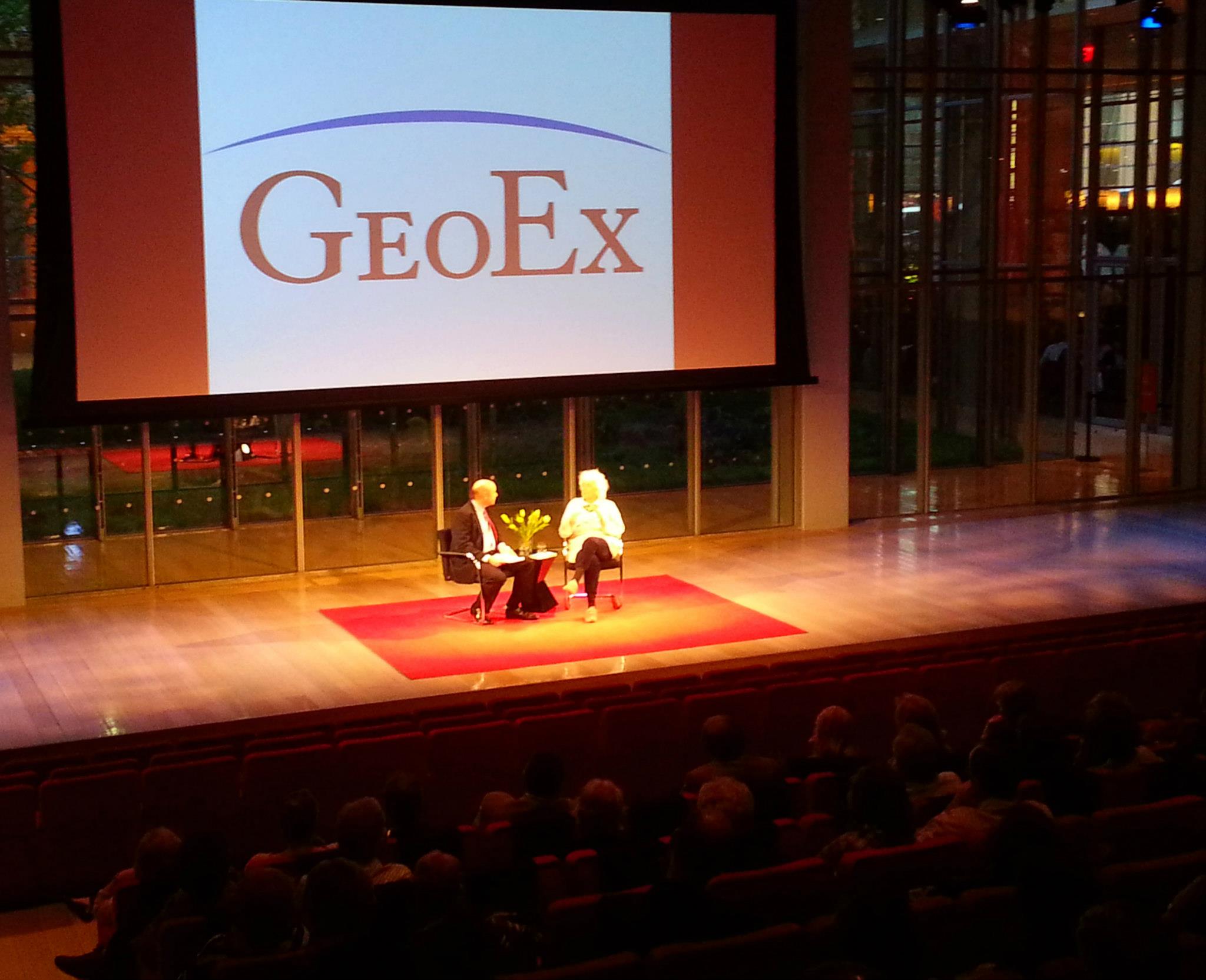Jan Morris in Conversation with Don George

Legendary travel writer Jan Morris met in conversation with Recce editor Don George on May 8 at the New York Times Center in Manhattan. It was an exhilarating evening, with the talk ranging from the slopes of Mount Everest to the streets of Trieste, Italy.
Our own Maura Ginty was in attendance. Here are excerpts from the notes she took:
Eighty-six-year-old and absolutely amazing legend Jan Morris strolls onto the stage with a swagger – and casually reminds us that she will notice and remember those of us who did not clap.
Her conversation with Don George begins at the beginning of Morris’s career as a reporter, with the scoop of a lifetime: the first successful ascent of Mount Everest, by a British expedition team. Everest is a story Morris has told innumerable times, but she tolerates questions about it graciously. Describing herself as “young, fit, ambitious, and brutal enough to climb Everest,” she was also sly enough to beat the other newspapers to announce the story. This was an era when runners, walkie-talkies, and decryptors all played a role in fishing out the right news. In the course of the expedition, she “invented a devilishly complicated and clever code” where the actual meaning was the opposite of the literal. As a result, her telegraph stating “Snow conditions bad advanced base abandoned May 29, awaiting improvement, all well” actually meant that the ascent had been successful – Everest had been conquered. The message was intercepted by a Reuters reporter, but while he knew something was afoot, he couldn’t quite figure out what. And that’s the hidden essence of what a Sherpa runner sent off safely.
Then Morris thought, “If I got down the mountain in time, I could get my report there for the coronation of Queen Elizabeth the II,” which, as she said, “seemed like a good milestone indeed, didn’t it?” Suddenly, she declares, “I started running down the mountain at dusk… Off we set, slithering down the mountain, through the ice falls, awaiting the avalanches… I was getting weaker and weaker, gathering dust as I slithered down Everest with my secret message… But then I had to write a long dispatch. I had to write it all myself since I couldn’t go up there again. I finally reached camp with my Sherpas and sent it off.”
Half a world away, “in gray old London, in on a golden coach came the news that a British expedition had climbed the highest point in the whole world…” Silence fills the room. “And now,” Morris adds, almost in a whisper, “I’m the only person left alive from that expedition.” Well, that’s not so surprising, she adds, since she was the second youngest person on the team. They were all “extraordinarily nice people,” she recalls, who became friends for life.
Morris surprises George when she reveals that the story was published in the Times of London without her byline, just as “From Our Special Correspondent.” She adds that she was not allowed to write about the expedition for 10 years – “at which point no one wanted to read about it.”
“Actually,” Morris continues, “a year in New York changed me more than Everest. Every year for 60 years I’ve come here – this is the 60th anniversary of both my Everest and New York expeditions. I’ve always found this a kind city and I’ve found kindness as the supreme principle in life.” In fact, Morris recalls, she once wrote that if she had to have a heart attack, she would choose to have it in New York, because she knew the kind people there would immediately come to her aid. George quickly assures her that she doesn’t need to have a heart attack at that moment to prove that New York is kind.
George asks her about the next stage in her life journey, and Morris describes how she turned to writing about cities: Venice – “the most beautiful melancholic city in the world after the war” – and eventually Trieste, her current favorite and the subject of what she describes as her last complete book, “Trieste and the Meaning of Nowhere.”
How does she apprehend a city, George asks. Morris responds immediately, “Wander aimlessly, grin like a dog, and run around the city, and it will seep into your pores.” On her first visit to New York, she recalls, she would simply ask for directions, and the stories would flow out, and those personal histories became entangled in the mood and history of the place.
Morris also recommends the smile test: “You smile at everyone who passes, and this is a gauge of the nature of the city at the moment.” In some places the locals look away in discomfort or disgust, in others they stare back dumbfoundedly, and in others, the fortunate places, her smile is brightly returned. “Your San Francisco,” she says, smiling at George, “that’s one of the smilingest places.”
At the end of their conversation, Morris tells all of us lucky souls in the audience the most important lesson she’s learned in a lifetime of intrepid travel and inquisitiveness: the importance of kindness. She announces that she’s thinking about starting a political party founded on kindness, and she asserts that people would vote for it in the millions. She’s serious about this, she says, and she especially wants schoolchildren to know about the indelible value and fun and ultimate profitability of kindness.
As the room erupts into applause, we all feel that we have been somehow blessed by her very presence – and we walk back into the city with a bit more brightness, and kindness, in our step.
*****
A video of this conversation may be viewed here.

